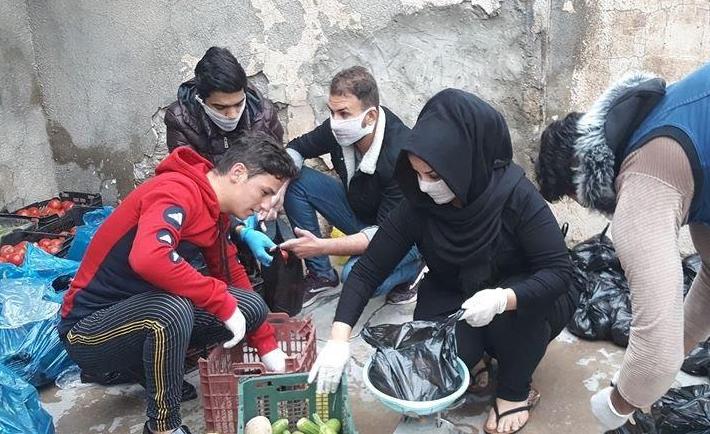
Women participating in NDI's National Reconciliation Program prepare food baskets in Kirkuk to help their community cope with movement restrictions taken in response to COVID-19
Health epidemics have a multilayered, long-standing impact on society as a whole, and an inordinate impact on women. Particularly in a country like Iraq where progress on women’s rights and issues has been slowly gaining more traction in recent years, the coronavirus threatens to halt progress on these key issues and give lower priorities to women’s concerns that are still vital during such a time of crisis. While more men than women seem to get infected with the new coronavirus globally--there is no gender-disaggregated data for Iraq--, the social impact of the virus in countries that already have been through the worst of the pandemic can serve as important indicators for Iraq.
The social impact of the coronavirus has had an uneven impact on women more than men in the first countries hit by the coronavirus in East Asia. Notably, in South Korea, women have taken on a larger burden than men in taking care of children forced to stay at home due to school closures, as societal norms more often place the burden for childcare on women. Not only does this put greater pressure on women who are in many cases already the primary caretakers at home, but it makes them more likely to lose their jobs as they are forced to divert more time to childcare. These societal norms also mean women are more likely to be exposed by the virus, as they are stuck in a caretaker role for sick family members and makeup over 70% of the healthcare sector according to a World Health Organization Report.
Women forced to stay home and work less in order to dedicate more time to caretaking also means that women are more likely to suffer from the economic impact of the virus, whether that means job loss or wage reductions. This means that even after the virus has effectively contained, women are more likely to suffer from the economic fallout than men long after the virus is gone.
In addition, in China, rights activists reported an increase in domestic violence cases, as lockdowns and economic pressure have increased tensions in many households. Particularly at the epicenter of the virus in Wuhan, China, activists reported a threefold increase in domestic abuse cases. The quarantine measures in place, while cases were at their height in China, made it difficult for activists to provide aid, and diverted police attention away from assisting women who suffered from domestic abuse. This disruption of support networks makes it more difficult for women to report domestic abuse cases and to get away from their abusers.
Social, cultural, and political barriers to women’s participation in Iraq might lead to disproportionate effects based on gender. First, there have already been voices raising concerns that some families might not allow women who had tested positive for the virus to be quarantined, as more traditional culture is against women to remain unaccompanied. Not only would this present a serious threat to the health of individual women, but such refusals by conservative families to follow the recommendations of medical personnel may contribute to undermining the government measures to contain the virus. Second, women’s representation in government is already limited in Iraq, and with a limited voice in the decision-making chambers of government, their gender-sensitive concerns will likely be less of a priority to Iraq’s policy makers. And finally, Iraq’s economic situation that was in decline even before the outbreak might further impact the poor economic opportunities already facing women in Iraq.
Beyond the loss of life and social and economic impacts on men and women in Iraq, the crisis is also an opportunity for the government and civil society to increase engagement with the most vulnerable groups, including women, and bring them in as a major element of preventing the spread of the virus. Societal norms placing women into the primary caretaker role in homes means they will have a greater awareness of how the virus is spreading, so they can report more accurate information. In addition, polling conducted in several countries suggests that women are more concerned with the spread of the virus than men. The government could take advantage of this trend by bringing women into the process of raising awareness and concern about the virus among Iraq’s population.
Given the unequal impact, the social impact of coronavirus will have on women, the Iraqi government and civil society partners should prioritize making sure issues that impact women are not sidelined during the crisis. Support networks should strengthen their outreach efforts and make resources for women’s health and domestic abuse support more accessible, ideally with government backing. It is especially important that the government prioritize getting out accurate information on the coronavirus and work with the support of tribal and religious leaders to encourage families to follow quarantine procedures for women who test positive for the virus.
